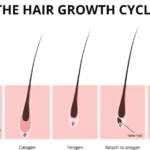Decoding the Lather: What is SLS?
[https://www.lolaapp.com/sodium-tallowate]
[https://www.lolaapp.com/piezo-igniter]
Sodium Lauryl Sulfate (SLS), a common ingredient in many shampoos, often sparks conversation—and sometimes concern. This guide provides a clear, evidence-based overview of SLS, exploring its function, potential benefits and drawbacks, and how to make informed choices for your hair care routine.
Understanding SLS: The Science of Suds
SLS is a surfactant, a type of detergent that attracts both water and oil. This dual action allows it to effectively bind to grease, dirt, and product buildup on your hair, making it easy to rinse away. SLS is also responsible for the rich, foamy lather often associated with a thorough clean. However, this powerful cleaning can sometimes be too effective.
How SLS Works: The Cleaning Crew in Your Shampoo
Imagine tiny SLS molecules, each with one end clinging to water and the other grabbing onto oil and dirt. This molecular tug-of-war lifts impurities away from your hair strands, allowing them to be washed away with water. This explains why SLS is so effective at removing excess oil, styling product residue, and even environmental pollutants, leaving your hair feeling clean and refreshed.
Benefits and Drawbacks: Weighing the Pros and Cons
While SLS excels at cleansing, this strength can also be a potential weakness. Its robust cleaning action may strip away natural oils essential for maintaining healthy, hydrated hair and scalp. This can sometimes lead to dryness, frizz, and scalp irritation, especially for individuals with sensitive skin or color-treated hair. Some ongoing research also suggests potential links between prolonged SLS exposure and certain skin conditions, although further investigation is needed.
SLS vs. SLES: A Gentler Alternative?
Sodium Laureth Sulfate (SLES), a close relative of SLS, is often marketed as a milder option. SLES undergoes an additional processing step (ethoxylation) which likely makes it less irritating. While still a surfactant, SLES is generally considered gentler than SLS. However, individual reactions vary, and some people may still experience dryness with SLES. It’s important to note that the ethoxylation process can sometimes lead to trace contamination with 1,4-dioxane, a potential carcinogen, although typically at very low levels.
Exploring the Sulfate-Free Universe: Gentler Cleansing Options
If the potential drawbacks of sulfates concern you, consider exploring sulfate-free shampoos. These formulas utilize milder surfactants, such as cocamidopropyl betaine, decyl glucoside, and sodium cocoyl isethionate, which aim to cleanse effectively without stripping away essential moisture. Sulfate-free shampoos are often recommended by dermatologists, especially for those with sensitive skin or conditions like eczema or psoriasis. While they may produce less lather, don’t equate that with less cleaning power.
Examples of popular sulfate-free shampoos include Redken Frizz Dismiss and AG Colour Savour. These shampoos offer gentle cleansing that can preserve the vibrancy of color-treated hair while minimizing dryness.
Choosing Your Ideal Shampoo: A Personalized Approach
Selecting the right shampoo hinges on understanding your hair type and scalp condition. If you have oily hair, you might tolerate SLS without issues. However, for dry, sensitive, or color-treated hair, a sulfate-free shampoo is likely a better choice. The American Academy of Dermatology recommends sulfate-free options for individuals with sensitive skin.
Ultimately, finding the right shampoo is a process of experimentation. Pay attention to how your hair and scalp respond and adjust your routine accordingly. Don’t be afraid to try different sulfate-free alternatives to find what works best for you.
Is SLS in Shampoo Bad for Hair? A Balanced Perspective
The question of whether SLS is “bad” for hair doesn’t have a simple answer. It depends on individual factors like hair type, scalp sensitivity, and frequency of use. This section explores the potential effects of SLS on hair, offering a nuanced perspective to help you make informed decisions.
The Two Sides of SLS: Cleansing Power vs. Potential Irritation
SLS is undeniably effective at cleaning. Its strong detergent properties quickly remove dirt, oil, and product buildup. This can be beneficial for those with oily hair. However, this same cleansing power can strip away natural oils, leading to dryness, frizz, and irritation, especially for individuals with dry, sensitive, or color-treated hair. Some experts suggest limiting the use of SLS-containing shampoos or alternating them with milder options to minimize potential damage.
SLS and Dry, Damaged Hair: A Delicate Balance
For individuals with dry, damaged, or color-treated hair, SLS can exacerbate existing issues. The stripping of natural oils can worsen dryness, increase frizz, and even accelerate color fading. In these cases, sulfate-free options are likely a better choice.
SLS and Sensitive Scalps: A Potential Irritant
SLS can be particularly problematic for sensitive scalps. Its harsh cleansing action can disrupt the scalp’s natural balance, leading to irritation, redness, itching, and flaking. For those with pre-existing conditions like eczema or psoriasis, SLS can worsen symptoms. If you experience any discomfort after using SLS-containing shampoos, switching to a sulfate-free formula may offer relief.
SLS and Color-Treated Hair: Protecting Your Investment
SLS can also accelerate the fading of hair color, especially shortly after dyeing. While not inherently harmful, regular use of SLS-containing shampoos can strip away color molecules, resulting in dull, faded hair. Sulfate-free shampoos are often recommended for color-treated hair to help maintain vibrancy and prolong color life.
Finding Your Perfect Match: SLS vs. Sulfate-Free
| Feature | SLS/SLES Shampoos | Sulfate-Free Shampoos |
|---|---|---|
| Cleansing | Strong, may be stripping | Gentle, less stripping |
| Lather | Abundant, foamy | Less lather |
| Scalp Sensitivity | May irritate sensitive scalps | Generally gentler on sensitive scalps |
| Color-Treated Hair | May accelerate color fading | Better for preserving color |
| Cost | Typically less expensive | Often more expensive |
How do I know if my shampoo has SLS? Decoding the Ingredient List
Determining if your shampoo contains SLS is straightforward. This section guides you through identifying SLS and its close relatives on the ingredient list, empowering you to make informed choices for your hair care.
Investigating the Ingredients: Your Shampoo Detective Work
The easiest way to identify SLS is to check the ingredient list on your shampoo bottle. Look for “Sodium Lauryl Sulfate (SLS)” or “Sodium Laureth Sulfate (SLES).” Other variations may include “ammonium lauryl sulfate” or “sodium dodecyl sulfate.”
Why Sulfates Exist: The Science Behind the Suds
Sulfates, derived from sulfuric acid, are powerful cleansing agents. They’re the reason your shampoo lathers and effectively removes dirt and oil. However, this strong cleaning action can sometimes strip hair’s natural oils, potentially leading to dryness and irritation.
SLS vs. SLES: A Tale of Two Sulfates
SLS is generally considered harsher than SLES, its ethoxylated counterpart. SLES undergoes an additional processing step which may make it gentler on the skin and scalp, but individual reactions can still vary.
SLS-Free Alternatives: Gentle Cleansing Options
If you’re sensitive to sulfates, explore the growing market of SLS-free shampoos. These formulas utilize milder cleansing agents, often derived from plants, to effectively clean hair without stripping away essential moisture.
Choosing Your Champion Shampoo: Making Informed Decisions
| Feature | SLS/SLES | SLS-Free |
|---|---|---|
| Cleansing | Powerful, may be too harsh for some. | Gentler, ideal for sensitive scalps. |
| Lather | Creates lots of bubbles. | May produce less lather. |
| Cost | Usually less expensive. | Can be a bit pricier. |
| Color Safety | Can sometimes fade color-treated hair. | Generally safer for color-treated hair. |
| Scalp Health | Might irritate sensitive scalps. | Less likely to cause irritation. |
Understanding the role of SLS in shampoo allows you to choose products that align with your hair type and scalp needs. Whether you embrace the cleansing power of SLS or prefer the gentle touch of sulfate-free formulas, informed choices empower you to achieve healthy, happy hair.
- Unlocking Francis Alexander Shields’ Finance Empire: A Comprehensive Biography - July 12, 2025
- Unveiling Francis Alexander Shields: A Business Legacy - July 12, 2025
- Francis Alexander Shields’ Business Career: A Comprehensive Overview - July 12, 2025















